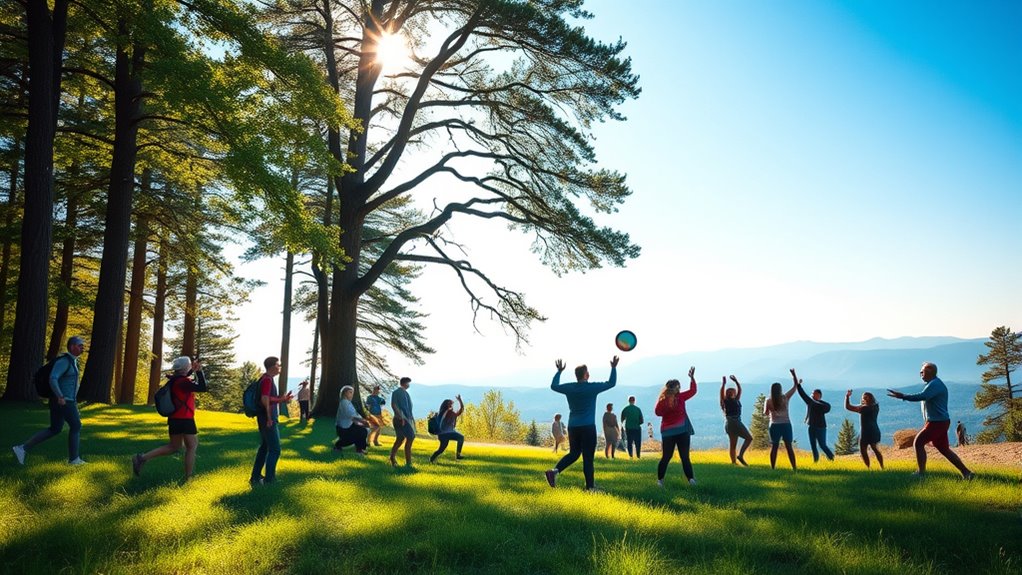Engaging in outdoor activities benefits both your body and mind. You’ll enjoy improved cardiovascular health, stronger muscles, and increased endurance while relishing fresh air and scenic views. Mentally, nature helps reduce anxiety, boost your mood, and promote relaxation. It also encourages social interactions that enhance your emotional well-being. Plus, spending time outdoors fosters mindfulness and appreciation for the environment. To discover how these activities can transform your overall health, keep exploring these natural perks.
Key Takeaways
- Outdoor activities improve cardiovascular health, strengthen muscles, and boost endurance through physical exercise like jogging, walking, and yoga.
- Spending time in nature releases mood-enhancing chemicals, reducing anxiety and depression while promoting relaxation.
- Engaging outdoors fosters social connections and community bonds through group sports, gardening, and recreational activities.
- Nature exposure enhances mindfulness, increases environmental awareness, and reduces stress, supporting emotional well-being.
- Outdoor activities provide a natural escape from urban stress, boosting energy, immune function, and overall mental health.

Spending time outdoors offers numerous benefits that can improve your physical, mental, and emotional well-being. One of the easiest ways to reap these rewards is by immersing yourself in urban green spaces. Parks, community gardens, and tree-lined streets aren’t just aesthetic additions—they serve as essential refuges from the hustle and bustle of city life. These areas provide a natural oasis where you can breathe fresh air, engage in physical activity, and disconnect from screens and daily stressors. Regular visits to urban green spaces can boost your mood, increase your energy levels, and even improve your immune function. They’re accessible, convenient, and an integral part of maintaining a balanced lifestyle. Promoting biodiversity in these spaces further enriches your experience and supports local ecosystems. Nature therapy, also known as ecotherapy, is gaining recognition for its profound effects on mental health. When you spend time in natural environments, your brain releases feel-good chemicals like serotonin and endorphins, reducing feelings of anxiety and depression. Nature’s calming influence helps slow down your racing thoughts, making it easier to relax and focus. Whether you’re walking through a park, sitting under a tree, or simply observing the greenery around you, you’re actively engaging in a form of therapy that restores your mental clarity and emotional resilience. This practice doesn’t require any special equipment—just a willingness to step outside and immerse yourself in nature’s calming presence. Engaging with urban green spaces also encourages physical activity, which is essential for your overall health. You might go for a jog, do some yoga, or take a leisurely stroll, all of which help improve cardiovascular health, strengthen muscles, and boost endurance. These activities are often more enjoyable outdoors because of the fresh air and scenic surroundings, making it easier to stick with your routine. Additionally, outdoor activities can help you build social connections—playing sports or joining community gardening projects allows you to foster relationships while staying active. Spending time outdoors can deepen your appreciation for the environment and foster a sense of mindfulness. When you’re in nature, you become more aware of your surroundings and more present in the moment. This mindfulness can help reduce stress and promote emotional balance. Supporting local biodiversity through native species planting and habitat creation can further enhance these benefits, making your outdoor experiences more rewarding. In summary, integrating regular visits to urban green spaces and embracing nature therapy can considerably enhance your physical health, mental clarity, and emotional stability. The outdoors isn’t just a place to pass time—it’s a powerful tool for nurturing your overall well-being.

Gaiam Essentials Thick Yoga Mat Fitness & Exercise Mat With Easy-Cinch Carrier Strap, Teal, 72"L X 24"W X 2/5 Inch Thick
Extra-Thick Cushioning for Joint Comfort : Made with 10mm (2/5") high-density NBR foam, this mat delivers plush cushioning…
As an affiliate, we earn on qualifying purchases.
As an affiliate, we earn on qualifying purchases.
Frequently Asked Questions
How Can Outdoor Activities Improve Sleep Quality?
Outdoor activities can substantially improve your sleep quality by increasing sun exposure, which helps regulate your circadian rhythm. When you spend time outside during the day, your body produces melatonin at night, making it easier to fall asleep. Plus, engaging in outdoor activities promotes better sleep hygiene by reducing stress and physical tension. As a result, you’ll enjoy more restful, restorative sleep each night, feeling more energized during the day.
Are Outdoor Activities Suitable for People With Physical Limitations?
Perfectly possible, you’re probably pondering. Yes, outdoor activities can suit people with physical limitations, especially when you explore adaptive sports designed for diverse abilities. Accessible parks and specialized equipment make movement manageable and enjoyable. Participating actively in these inclusive environments empowers you, promotes physical fitness, and improves mental well-being without overexertion. So, don’t hesitate—embrace outdoor adventures tailored to your needs and unleash newfound freedom and fun.
What Are the Best Outdoor Exercises for Mental Health?
You can boost your mental health with outdoor exercises like mindfulness meditation, where you focus on your breath and surroundings, reducing stress. Nature journaling also helps by encouraging reflection and gratitude as you observe your environment. These activities promote relaxation, clarity, and emotional balance, making outdoor exercises a powerful way to nurture your mental well-being. Incorporate them into your routine for lasting positive effects.
How Does Exposure to Nature Boost Creativity?
You might think staring at a blank wall sparks creativity, but nature’s influence actually does wonders. When you step outside, the fresh air and natural scenes quietly boost your creative inspiration. Ironically, the chaos of daily life often stifles your ideas, while the calm of nature clears your mind. Exposure to nature release new perspectives, helping your mind wander freely, so you can come up with fresh, innovative solutions more easily.
Can Outdoor Activities Help Manage Stress and Anxiety?
Outdoor activities can profoundly help you manage stress and anxiety by encouraging mindfulness practices, such as focusing on your surroundings and breathing deeply. Engaging in social activities outdoors also boosts your mood and reduces feelings of loneliness. When you spend time outside, you naturally relax and disconnect from daily pressures, making it easier to regulate your emotions. So, get outside, be present, and enjoy the calming effects of nature on your mental well-being.

ZAZE Extra Large Picnic Outdoor Blanket, 80''x80'' Waterproof Foldable Blankets Gingham Picnic Mat for Beach, Camping Grass Lawn Park Accessories Cute Couple Gifts Ideas Wedding Registry(Green White)
80*80 Oversized for 4-8 Adults: ZAZE Picnic blankets unfolded size is 80''x 80'', it’s large enough to fit…
As an affiliate, we earn on qualifying purchases.
As an affiliate, we earn on qualifying purchases.
Conclusion
Spending time outdoors boosts your physical and mental health, making you stronger and more resilient. Just like sunlight nourishes plants, outdoor activities nourish your mind and body. So, step outside regularly—whether you’re hiking, cycling, or just walking—because the benefits are clear. Embrace the fresh air and let nature be your remedy for stress and fatigue. Remember, outdoor time is like a reset button, helping you feel refreshed and revitalized every day.

Bearwill Soccer Goal, Kids Soccer Goals for Backyard Set of 2, 4x3ft Portable Soccer Goal Pop Up Soccer Net, Kids Soccer Net for Backyard Training Equipment with Soccer Ball, Ladder, Cones, Targets
BUILT TO LAST: Bearwill kids soccer goal is constructed with a knotted polyethylene tear-resistant netting , robust 450D…
As an affiliate, we earn on qualifying purchases.
As an affiliate, we earn on qualifying purchases.

Gardening Tools Set of 10 – Complete Heavy Duty Garden Tools Set with Fashion Handbag – Durable Gardening Supplies Kit Ideal Garden Gifts for Women
PLAY22 GARDEN TOOLS SET includes a weeder, hand fork, hand rake, transplanter, trowel, pruner, spray bottle, and a…
As an affiliate, we earn on qualifying purchases.
As an affiliate, we earn on qualifying purchases.










